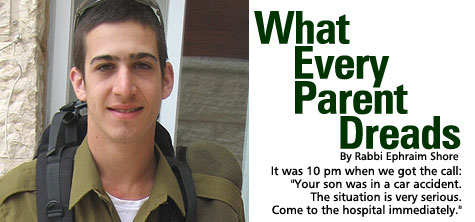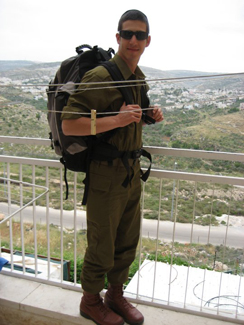 An Open Letter to University Presidents
An Open Letter to University Presidents


9 min read
It was 10 pm when we got the call: "Your son was in a car accident. The situation is very serious. Come to the hospital immediately."
At around 10 pm we got the phone call that every parent dreads. I knew it was bad when I saw my wife's knees buckle and her hand grasped the wall for support. She handed me the phone.
"We think your son may have been involved in a traffic accident. We can't release any details until you identify him as your son. You should both come to the hospital immediately where a social worker will meet you. The situation is very serious."
 As we made that incredibly long journey to the hospital, my wife and I held hands and cried. I warned her to prepare for the worse. I was quite convinced that our 21 year old son, Yaakov, was dead.
As we made that incredibly long journey to the hospital, my wife and I held hands and cried. I warned her to prepare for the worse. I was quite convinced that our 21 year old son, Yaakov, was dead.
I can't imagine any other scenario where hearing that my child is undergoing emergency brain surgery would be a relief, but in this case it was. We were devastated, but there was hope.
For two more hours they refused to tell us anything until our son emerged from the first of his two skull surgeries of that endless night. They finally told us that Yaakov had been hit by a car on a major road while roller blading. He sustained a severe head injury as well as broken bones. They were working to relieve the pressure from bleeding and swelling in his brain.
Yaakov was just completing his army service. He had served as a combat soldier in the Nachal Charedi, an Orthodox unit in the IDF. When home, he loves going on long bike and roller blade rides around Jerusalem, discovering every nook and cranny of the beautiful city. He is a master roller blader and an avid athlete.
Related Article: Raising Yehuda
We asked the usual questions: "How bad is it? Will he live? If he lives, will there be permanent damage? Will he ever walk or talk again? Will he have the same personality?"
The answer to all these questions was the same: We don't know. And we won't know for a long time.
We felt like the car had ploughed into us.
The one thing they did know was that the first three days were critical for his survival. In those first 72 hours the brain continues to swell in reaction to the trauma, putting additional pressure on the brain which can lead to irreversible injury.
We still don't know what Yaakov's outcome will be.
Since then, my wife has hardly left his side. He lies in ICU in an induced coma to keep his brain pressure down, with a hundred pipes leading in and out of almost every part of his body.
We thank God that he has now passed the critical danger point and the pressure has begun to slowly go down. But our eyes still run a constant circular track, darting from the book of Psalms or Torah that we read to him, to his angelic quiet face (now growing a young man's fuzzy beard), to the menacing monitors constantly changing their frightening numbers.
We still don't know what Yaakov's outcome will be. We've learned that the brain is very unknown and the experts have no way to assess damage or repair. The body (read: God) does the work. Doctors merely create the environment to allow the body to repair itself. Until the body starts to do something like talking, no one can guess if it will. All they can tell us with any surety is that it will take a long period of patience and therapy.
I have never known such pain in my life. I didn't know this caliber of pain even existed. I've read about it, but it was tucked away in the realm of imagination, where it belonged. It had no part of my secure world.
Shock is a big part of it. Overnight I went from a "normal" family man with a busy professional life to a "father of a boy fighting for his life in ICU with possible permanent brain damage." We went far too quickly from being parents terrified by a child's high fever, to parents dancing for joy when our son moves his hand three inches, which thank God happened yesterday for the first time.
It takes time.
The anguish, fear, terror, sadness, guilt, anger rolled over me in colossal, confusing waves. Numbness would periodically make a merciful visit, an automated defensive response to prevent the approaching, seemingly inevitable shattering of my fragile being. I was defenseless against the onslaught. The mind struggled to sort out the feelings and make sense of the raging offensive unfolding inside me but it was in vain, like a traffic cop holding up his pathetic little hand as a 10-ton truck smashes into him.
Coming Together
The biggest surprise to us has been both the unimaginable outpouring of love and support --and just how much a difference it makes. Around the world people are praying and doing mitzvot and good deeds, beseeching God that Yaakov ben Esther should have a full and fast recovery. Thousands of emails, millions of prayers, groups getting together to complete the Book of Psalms, Torah classes, publications have been dedicated for his merit. It was as if a massive machine came together within hours, mobilizing thousands of disparate parts into an integrated international effort to storm the heavens for Yaakov's recovery, and to strengthen us in our desperation.
The biggest surprise to us has been both the unimaginable outpouring of love and support --and just how much a difference it makes.
People in Miami, New York, Costa Rica, Switzerland, and Mexico, Jerusalem and Tel Aviv, Australia and Toronto. A busload of widows prayed for him at the graves of the righteous in Israel. People I lost track of literally 20 years ago reconnected to express their solidarity. Religious and secular have joined together in a united prayer, tangibly (for me) climbing to the heavens. Friends kicked in to take over our busy household: transportation to schools, babysitting, food, shopping, laundry, cleaning, even stuff I never get around to doing. It has been an incredible whirlwind.
With everyone coming together to help, we’ve seen that the Jewish people truly are one unit. That was the prerequisite for receiving the Torah at Mount Sinai. Because unity is what allows miracles to happen.
During the first terrifying night, at 3:00 in the morning a friend showed up, somehow finding us in the bowels of the hospital near the surgical suites. His family had survived a major car accident which included many brain traumas and he came to reassure us that there was hope.
Don’t Blame, Don’t Complain
So what can you do to help?
It is a great merit for a sick person when others are inspired by him to improve their own lives.
Two of Yaakov's excellent character traits are worthy of all of us to emulate, and by doing so, he will God willing benefit as well.
First, no matter what happens to him in life, he never complains. For someone his age, he's had a relatively tough life. We never heard him grumble or whine; he stoically accepts his challenges and moves forward. His army buddies said that even during the most difficult tasks (like 60 km mountain marches wearing massive backpacks and heavy rifles), when everyone else was maxing out on kvetching, he would never join the party.
After receiving the Torah at Sinai, the Jewish people (unfortunately) do a fair bit of moaning as they wander through the desert. At first glance they look like real crybabies. But when you think about it, they were traveling in a hot, dry desert, faced with major problems like no water and no food! What do we expect them to do if not complain?
Rabbi Noah Weinberg, my rabbi, answered that they should have asked, "God, why aren’t you giving us water? We know You love us and we know You can give it to us easily, so what do You want us to learn or change? Please help us understand Your message." That's legitimate; complaining is not. We complain when we choose the comfort of suffering our lot rather than embracing the effort to try improve it.
We are asking everyone to try raise your sensitivities in these two areas: Don’t' blame and don't complain.
And Yaakov never blames. Believe me, he's had good cause. Blaming is a handy mechanism to remove any personal responsibility for one's fate. When we avoid blaming, we have to face our challenges head on, something human nature desires to avoid at all costs.
In Yaakov's merit, we are asking everyone to try raise your sensitivities in these two areas: DON'T BLAME AND DON'T COMPLAIN.
It’s also a practical way to prepare for Shavuot and reaccept the Torah. Blaming and complaining create negativity and drive people apart. Making the conscious effort during your day to eradicate them is a practical way to build unity in your home and workplace. We suggest you print signs for your home and office -- DON'T BLAME AND DON'T COMPLAIN – to serve as reminders to bite your tongue and start seeing things in a more constructive manner. It will certainly make your life better and hopefully Yaakov's as well, and for that we thank you from the bottom of our hearts.
Please pray for Yaakov ben Esther. For the latest updates on how he’s doing and to share your experiences in not blaming or complaining, visit www.yaakovbenesther.com
